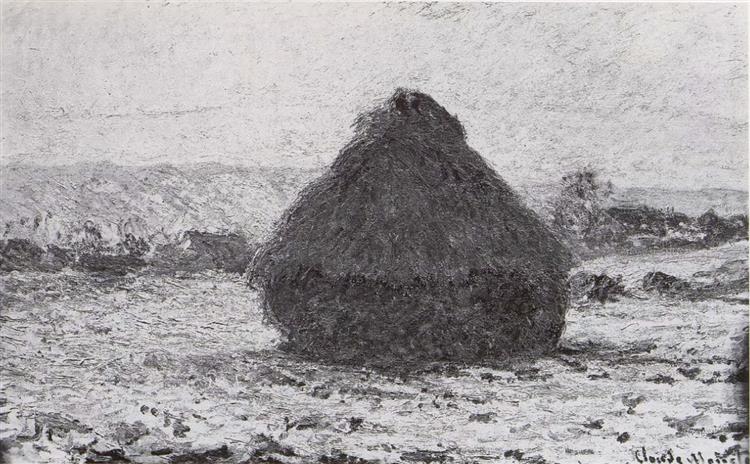Description
L'œuvre "Gran in Sunlight - Snow Effect" (1891) de Claude Monet est une représentation magistrale de l'intellect créatif et de la capacité technique de la maître impressionniste. Cette peinture, qui fait partie d'une série qui explore les changements de lumière et de couleur à divers moments de la journée, est dans le contexte de leur intérêt pour les paysages et la nature agricoles, des éléments récurrents dans son répertoire. Monet, tout au long de sa carrière, s'est consacré à la capture de l'essence du moment, et ce travail est un reflet clair de son approche sensorielle et temporelle.
Lors de l'observation de la composition, la première chose qui attire l'attention est la représentation du monticule de paille, qui devient l'axe central de l'œuvre. Cet élément, souvent insignifiant dans la vie rurale, est élevé à un statut presque sculptural. La forme du grain, qui se démarque sur la scène, est ornée d'un manteau de neige qui attrape brillamment la lumière, mettant en évidence la texture et la volumétrie de l'objet. Monet utilise des coups de pinceau lâches et rapides qui contribuent à la sensation d'immédiateté et de mouvement, étant dans cette ligne diffuse entre le figuratif et le résumé.
La couleur est un autre aspect crucial de ce travail. Monet implémente un schéma coloré qui comprend une palette neutre avec des tons crémeux et chauds qui contrastent avec le blanc de neige pur. Celles-ci signifient imprègnent un sentiment de chaleur, malgré le froid associé à un paysage d'hiver, créant une atmosphère délicate. Les ombres du bleu et du gris sont fusionnées avec les couleurs jaunes et dorées du grain, une technique qui a perfectionné tout au long de sa carrière, faisant de la lumière et de l'ombre un rôle principal dans son expression artistique.
La lumière est sans aucun doute le protagoniste de l'œuvre. Monet démontre sa maîtrise en capturant la luminosité changeante du soleil, qui semble se refléter sur la neige, créant un effet presque éthéré. Chaque éclair de lumière devient un point d'attention focal, guidant le regard du spectateur à travers l'œuvre et manifestant l'interaction constante entre l'objet et son environnement. Cette dynamique est inhérente au mouvement impressionniste, qui cherche à représenter la perception visuelle à un moment particulier, au lieu d'un portrait statique.
Il est important de noter que dans "Grain in Sunlight - Snow Effect", il n'y a pas d'humain ou d'animaux; L'approche vise complètement la nature et la représentation du paysage rural. Cependant, l'absence de personnages ne reste pas de vitalité à la scène; Au contraire, il permet à l'attention de se concentrer complètement sur l'harmonie et le dialogue entre la lumière et l'ombre, entre l'objet et son environnement. Cette œuvre, bien qu'intimée dans sa présentation, évoque un sentiment d'universalité et de connexion avec la nature.
Monet a peint plusieurs études et séries de céréales dans différentes conditions de lumière et d'atmosphères, et cette pièce est l'une des plus notables pour son exploration attentive de l'effet de la neige sous la lumière du soleil. Il s'inscrit dans une période où Monet a cherché un moyen de libérer sa représentation de la réalité, laissant son coup de pinceau se déchaîner sur la toile et lui a permis de créer des images qui capturaient l'essence même de l'expérience visuelle.
Ainsi, "Grain in Sunlight - Snow Effet" est érigé non seulement comme un témoignage de la virtuosité de Monet, mais aussi comme une icône de l'impressionnisme, où la perception sensorielle de l'encone devient le moyen d'explorer et de communiquer des émotions et des sensations profondes. Ce travail résonne dans le spectateur, l'invitant à contempler la merveille de la nature et la beauté éphémère qui réside dans des moments quotidiens.
KUADROS ©, une peinture célèbre sur votre mur.
Peintures à l'huile fabriquées à la main, avec la qualité des artistes professionnels et le sceau distinctif de KUADROS ©.
Service de reproduction des images avec garantie de satisfaction. Si vous n'êtes pas complètement satisfait de la réplique de votre peinture, nous remboursons votre argent à 100%.

